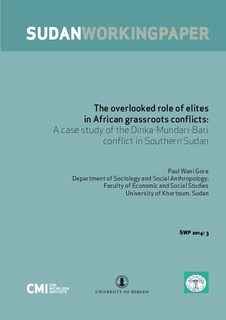The overlooked role of elites in African grassroots conflicts: A case study of the Dinka-Mundari-Bari conflict in Southern Sudan
Working paper
Permanent lenke
http://hdl.handle.net/11250/2475006Utgivelsesdato
2014-12-15Metadata
Vis full innførselSamlinger
- Publications [1488]
Originalversjon
Bergen: Chr. Michelsen Institute (CMI Sudan Working Paper WP 2014:3) 27 p.Sammendrag
Many analysts of grassroots conflicts in African emphasized one of the following factors to be the most important: ethnic divisions, competition over resources or competition between pastoralists and agriculturalists. The role of elites has been down played in such conflicts. This argument is being challenged by current evidence as shown by the Dinka-Mundari-Bari Conflict in Juba County in Southern Sudan. The data for this paper is derived mainly from a longitudinal study dating back to 1972 using observation and interviews as the main methods of data collection. Other sources of data included historical and recent reports of conflicts in the area. The major findings of the study are that: While low-keyed conflicts between the Dinka-Bor and the Bari-Speaking group existed in the past over the ownership and use of natural resources, they have been transformed into violent political conflicts over the years. The fragmentation of centers of political power, the divide-and-rule strategy of the Central Government, and the divisions between the elites of the two ethnic groups, who weakened local administrative structures and traditional mechanisms in conflict management and resolution, have sharpened the ethnic differences and competition over resources. The manipulation of ethnic differences by opposing groups in the various civil wars in Sudan and by the elites at the centers of political power is the main cause of transforming traditional competition over natural resources into violent conflicts.
